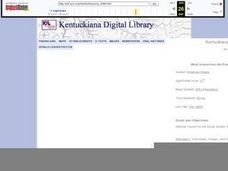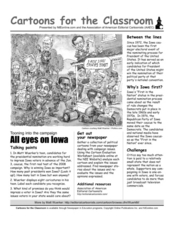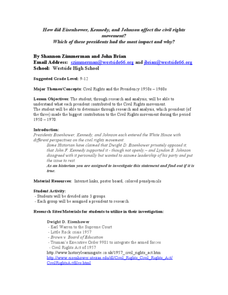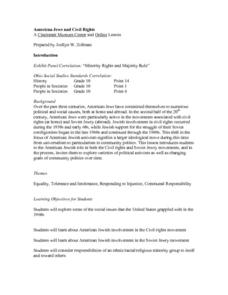National Endowment for the Humanities
Revolution '67, Lesson 2: What Happened in July 1967? How Do We Know?
Even in a world in which dozens of participants and curious onlookers record every controversial event, the basic facts of what happened are often in dispute. Revolution '67, Lesson 2 explores 1967 Newark, New Jersey using an examination...
Museum of Tolerance
Making Lemonade: Responding to Oppression in Empowering Ways
An activity focused on tolerance encourages class members to consider how they might respond when they or someone else is the target of oppression and discrimination. After researching how some key figures responded to the anti-Semitism...
Curated OER
Cartoons for the Classroom: Charisma vs. Experience
Which is more important for a president: experience or charisma? Scholars consider this as they analyze 2 political cartoons in this analysis handout. Background information gives context through a quote from The Telegraph, and 3 talking...
Curated OER
President Kennedy and Kentucky Politics
Learners explore the interactions between Kentucky Governor Bert Combs and President Kennedy. They examine JFK's interest in Kentucky politics and construct history through Governor Bert Comb's interview.
Curated OER
Slices of American Pie: The 1960s Through Music
Eleventh graders examine political, cultural, and social movements through music. In this 1960s American history lesson, 11th graders explore the music of the decade in order to better understand the complexity of the time period....
National Endowment for the Humanities
Revolution '67, Lesson 1: Protest: Why and How
To some people, protesting is as American as apple pie, but the factors that lead to protests can be as confusing to veteran activists as to today's youth. Revolution '67 explores the riots in Newark, New Jersey as a case study. Using...
National Endowment for the Humanities
Martin Luther King, Jr. and Nonviolent Resistance
Was nonviolent resistance the best means of securing civil rights for black Americans in the 1960s? In this highly engaging and informative lesson, your young historians will closely analyze several key documents from the civil rights...
Curated OER
1960 America: Foreign Policy
The 1960's marked shifts in American culture, politics, and policy. Your class groups up to research a series of primary source documents resulting in a timeline and a 15 minute oral presentation. Active learning all the way.
PBS
Making Change: Revolutionary Tactics of the Civil Rights Movement
The film American Revolutionary: The Evolution of Grace Lee Boggs introduces viewers to the differing philosophies of and strategies employed by 1960s civil rights leaders such as Malcolm X and Martin Luther King, Jr. and the debate over...
Annenberg Foundation
Egalitarian America
What does a true American represent? Scholars investigate the equal rights era of the 1960s and 1970s in the 20th installment of a 22-part series on American history. Using photographic, magazine, written, and video evidence, groups...
Curated OER
Interpreting Political Cartoons – Vietnam Era
Eleventh graders explore opinions regarding U.S. involvement in Vietnam. In this primary source analysis activity, 11th graders analyze political cartoons related to the Vietnam War and then respond to the provided discussion questions.
Curated OER
Cartoons for the Classroom: All Eyes on the Iowa Caucus
Explore the primary elections through political cartoons. Three talking points guide deeper thinking as pupils analyze a cartoon, which depicts the 2008 campaigning in Iowa. Analysts identify caricatures, research why winning Iowa is...
Defining US
Integration of Education and American Society
How did the struggle for Civil Rights during the 1950s transform American society and politics? Why are American schools integrated today? Class members explore these essential questions by examining a series of primary and secondary...
Curated OER
Music: A Nation's Voice
Students investigate the impact of popular music in 1960's America. For this music and history lesson, students listen to several identified songs from the decade and analyze their lyrics. Students discuss their impressions and then...
Curated OER
Analyzing the economic, political, social, and cultural transformation of the United States since World War II
Eleventh graders examine political issues in the United States between 1936 and 2000. In this American history lesson, 11th graders study the economy, education, government, civil rights, and sports of this time period. Students compare...
Curated OER
Power to the People: Social Movements of the 1960s
Students engage in a professional development workshop for teachers in the delivery of curriculum about the era of the 1960's. The emphasis of the workshop is using popular culture of the time in order to launch investigations that are...
Curated OER
Active Citizenship: The Civil Rights Work of Bob Moses
Students discuss and describe the impact of Bob Moses as an activist, compare and contrast the work of Bob Moses in the 1960's and today and develop an action plan regarding an issue they feel strongly about.
Curated OER
The Decision to Americanize the War in Vietnam
Students research the major events of the Vietnam War and construct a timeline. They do the same with the presidency of Lyndon B. Johnson or the 1960's. They act as an advisor to President Johnson to recommend a course of action...
National First Ladies' Library
The History of Jim Crow: Legal Racism in America
Students study the history and culture of Jim Crow, as well as the scope of Jim Crow laws across the United States. They consider the concepts of terror and triumph with respect to the history of Jim Crow, the recognition of evidence of...
GCSE Modern World History
Mao's China
Here is a great textbook chapter on China's establishment as a communist state in 1949 and the effects of World War II on the nation. The first page prompts learners to complete a timeline activity as they read the material, which...
Curated OER
In the Struggle for Equality and Justice for All
Students focus on the struggle for minorities rights. They describe the civil rights movement of the late 1950's and the 1960's. They trace the roots of the movement in the second-class treatment accorded many black Americans and...
Curated OER
How did Eisenhower, Kennedy, and Johnson affect the Civil Rights Movement?
Students research Eisenhower, Kennedy, and Johnson then utilize their findings to determine what each of the three Presidents contributed to the Civil Rights Movement. In this U.S. History lesson, students work in small groups to create...
Curated OER
American Jews and Civil Rights
Tenth graders examine the Civil Rights movement of the 1960's and how American Jews were involved. They discuss the responsibilities of any minority or ethnic group. They consider the process of change in politics as well.
Curated OER
The Cold War: Planning for Survival
Learners prepare a documentary-style dramatization about government and personal measures taken to ensure survival in the event of nuclear war.

























